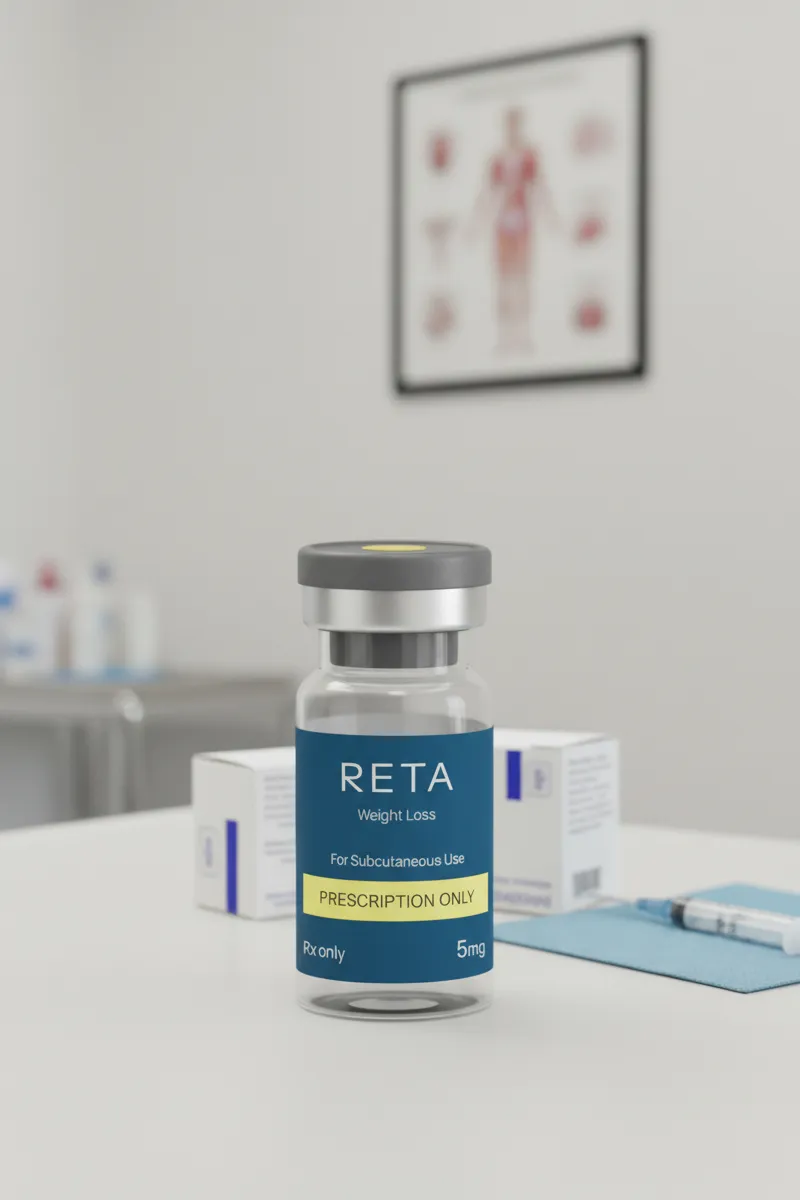Retatrutide Clinical Results: How Effective Is the New Triple Hormone Drug?
Explore the 2025 clinical results of Retatrutide, Eli Lilly’s new triple-hormone obesity drug. Learn about its weight loss efficacy, dosing, side effects, and how it compares to Semaglutide and Tirzepatide.

Introduction
In just a few years, weight-loss drugs have gone from modest results to transformations once thought impossible without surgery. Now, a new candidate called Retatrutide is drawing global attention. Developed by Eli Lilly, this investigational drug may push medical weight loss to new limits – with studies showing average reductions of more than 20% of body weight in under a year.
Retatrutide’s early results sound almost too good to be true. But what does the data actually show, and what makes this drug different from the GLP-1 medications already on the market?
Retatrutide: Overview of the Latest Clinical Trials
The development of Retatrutide marks one of the most ambitious steps in modern obesity and metabolic research. This new drug from Eli Lilly works differently from current GLP-1–based medications by targeting three hormone receptors at once: GLP-1, GIP, and glucagon.
Early clinical trials have delivered results that have surprised even seasoned researchers. Participants experienced average weight reductions of more than 20%, improved liver health, and better metabolic profiles - all within a year of treatment.
Most of the available data come from the Phase 2 study published in The New England Journal of Medicine in 2023, alongside follow-up analyses presented in 2024 and 2025. These studies serve as the foundation for understanding how effective and tolerable Retatrutide truly is.
Study Design and Participant Profile
The Phase 2 trial included 338 adults with obesity, defined as a BMI of 30 or higher, or at least 27 with a weight-related condition such as hypertension or dyslipidemia. Participants did not have diabetes, allowing researchers to focus purely on weight and metabolic effects.
The study was randomized, double-blind, and placebo-controlled, which is the gold standard for clinical accuracy.
Participants were divided into groups receiving either 1 mg, 4 mg, 8 mg, or 12 mg of Retatrutide weekly, or a placebo injection. The trial ran for 48 weeks, with an early evaluation at week 24. All participants received identical lifestyle counseling on diet and activity to minimize external influences.
Baseline demographics showed an average age of 48 years and a mean body weight of about 107 kilograms (236 pounds). Both men and women were well represented, and the majority had struggled with obesity for years before entering the study.
Weight-Loss Outcomes
The headline findings were clear: Retatrutide produced dose-dependent, significant, and sustained weight loss.
After 24 weeks, average reductions in body weight were as follows:
- 1 mg: about 7%
- 4 mg: about 13%
- 8 mg: about 17%
- 12 mg: about 17.5%
- Placebo: 1.6%
At 48 weeks, results became even stronger:
- 1 mg: 8.7%
- 4 mg: 17.1%
- 8 mg: 22.8%
- 12 mg: 24.2%
- Placebo: 2.1%
Notably, the trial had not yet reached a clear plateau, meaning weight loss might have continued with longer treatment. These numbers put Retatrutide ahead of other anti-obesity drugs in development and even approach the range seen after some bariatric surgeries.
Average Percentage Reduction After 6 and 12 Months
To make the data more relatable, consider this timeline:
- 6 months (24 weeks): Participants lost 12–17% of body weight depending on the dose.
- 12 months (48 weeks): The highest-dose group reached nearly 24% loss on average.
In practical terms, for a person weighing 230 pounds, that equals around 55 pounds lost in one year - without surgical intervention.
Nearly every participant on the 8 mg or 12 mg dose achieved clinically meaningful weight reduction.
- 100% lost at least 5% of their weight.
- 93% lost 10% or more.
- 83% lost at least 15%.
That level of consistency is rarely seen with pharmacologic therapy and suggests Retatrutide’s triple-hormone approach may provide a more reliable response across patients.
Effects on Blood Sugar and Insulin Resistance
Although the study excluded people with type 2 diabetes, researchers still tracked how Retatrutide influenced glucose metabolism. Even in non-diabetic participants, the drug lowered fasting glucose and improved insulin sensitivity.
This improvement is believed to result from the combined GIP and GLP-1 activity, which enhances insulin secretion in response to meals while reducing glucagon levels that drive blood sugar spikes.
In smaller follow-up studies involving individuals with type 2 diabetes, Retatrutide led to A1C reductions of up to 2 percentage points, along with consistent weight loss. These findings hint that the drug might one day serve dual purposes: managing both obesity and diabetes, similar to how tirzepatide evolved into Zepbound and Mounjaro.
Results Beyond Weight Loss: Liver Fat and Lipid Profile
Liver Fat Reduction
One of the most remarkable outcomes came from a Phase 2a substudy focused on patients with metabolic dysfunction-associated steatotic liver disease (MASLD). After 24 weeks, MRI scans revealed a reduction in liver fat of up to 82% in those receiving higher doses.
By 48 weeks, most participants had near-complete resolution of liver fat, a result rarely seen even with intensive lifestyle or drug-based therapy. This finding positions Retatrutide as a promising candidate for future treatment of fatty liver disease, which currently lacks effective medications.
Lipid and Cardiovascular Markers
In addition to liver fat, the trials showed major improvements in lipid and cardiovascular markers:
- Non-HDL cholesterol dropped by about 25–27%.
- Triglycerides decreased by 35–40%.
- Blood pressure fell by around 7 mm Hg systolic and 2 mm Hg diastolic on average.
These shifts reflect a healthier metabolic state that could translate into lower cardiovascular risk over time - something larger studies will need to confirm.
How Retatrutide Compares to Other Medications in Data
Even a few extra percentage points of sustained weight loss can have large clinical implications. Every 5% drop in body weight is linked to measurable reductions in blood sugar, cholesterol, and inflammation. A 20–25% loss can reverse fatty liver disease and significantly lower cardiovascular risk.
Limitations and What Future Studies Need to Prove
Despite its potential, Retatrutide’s data come primarily from short-term trials. Longer and larger studies must answer key questions:
- Durability: Will weight loss plateau or rebound after a year or more of treatment?
- Safety: Are there long-term effects on the pancreas, gallbladder, or thyroid similar to other incretin drugs?
- Broader populations: How effective and safe is it for older adults, those with advanced diabetes, or people with cardiovascular disease?
- Accessibility: As with other GLP-1 medications, pricing and insurance coverage will influence how many patients can realistically use it.
Phase 3 trials are now underway to address these questions. If the results remain consistent, Retatrutide could become the most powerful obesity drug yet developed.
Conclusion
Retatrutide’s triple-hormone design represents the next evolution in obesity treatment. It doesn’t just suppress appetite – it changes how the body regulates energy balance, glucose, and fat metabolism.
The Phase 2 findings show average weight loss of 22–24% in 12 months, dramatic reductions in liver fat, and improved cardiovascular markers. While side effects are common, they appear manageable and similar to other medications in its class.
If upcoming trials confirm these outcomes, Retatrutide could reshape how doctors treat not only obesity but also related metabolic diseases. For now, it stands as one of the most promising advances in metabolic medicine in years — a step closer to bridging the gap between pharmacology and the transformative results once reserved for surgery.
Frequently Asked Questions
Retatrutide is an investigational weight-loss medication developed by Eli Lilly. Unlike other drugs that act on one or two hormone pathways, Retatrutide targets three at once – GLP-1, GIP, and glucagon receptors. This triple action helps reduce appetite, improve insulin function, and increase fat burning, which together lead to significant and sustained weight loss.
In clinical trials, participants lost up to 24% of their body weight within 48 weeks when taking the highest dose. Even moderate doses resulted in 15–20% reductions, far exceeding the results seen with most currently approved medications.
Yes. Trials show that Retatrutide not only reduces body weight but also improves insulin sensitivity, lowers fasting glucose, and dramatically decreases liver fat levels - in some cases by more than 80%. These combined effects suggest it could benefit people with metabolic or fatty liver disease in the future.
Retatrutide is still in clinical development and not yet approved for public use. Early studies show it’s generally well tolerated, with side effects similar to other GLP-1 medications - mostly nausea, mild stomach issues, and fatigue during dose escalation. Larger Phase 3 trials now underway will confirm long-term safety and effectiveness before it reaches the market.
Related Topics
Evidence-based articles to support your journey toward sustainable health.
Register your interest in Retatrutide
Retatrutide is currently not available, but once it is approved, you’ll be the first to get notified. Sign up now and stay informed.
Simple one-time sign-up
Early access to availability updates
Exclusive status among the first users
Advantage over non-registered users
%201.webp)
.svg)
.webp)


